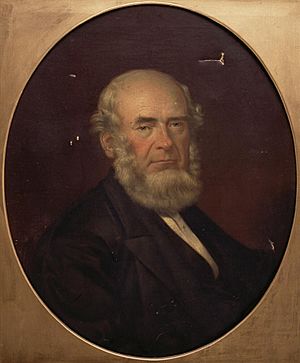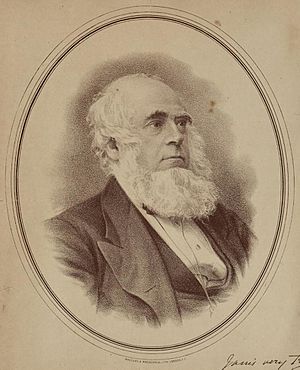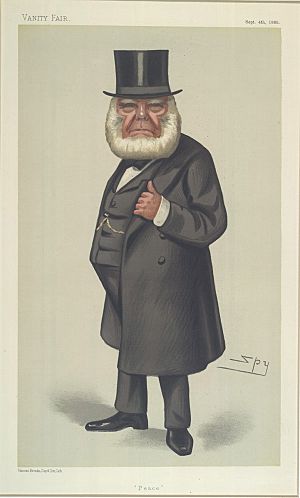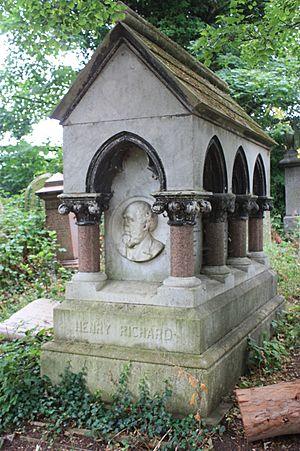Henry Richard facts for kids
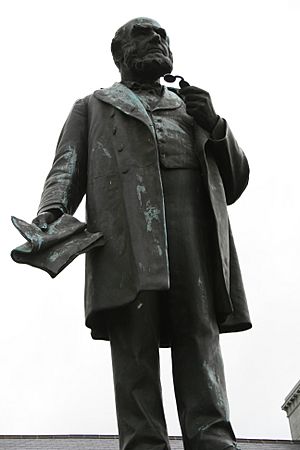
Henry Richard (born 3 April 1812 – died 20 August 1888) was a Welsh minister and politician. He served as a Member of Parliament (MP) for Wales from 1868 to 1888. Henry Richard was a strong supporter of peace and solving problems between countries without fighting. He worked as the secretary of the Peace Society for 40 years. He also worked to end slavery.
Contents
Early Life and Ministry
Henry Richard was born in 1812 in Tregaron, a town in Wales. His father, Ebenezer Richard, was also a minister. Henry went to school in Llangeitho and later studied in London to become a minister.
In 1835, Henry became a pastor at the Marlborough Chapel in London. He worked hard to raise money for the chapel. He also helped start a school there.
Working for Peace
In 1850, Henry Richard left his church job to work full-time for the Peace Society. He had already been working there part-time for two years. He helped organize many peace meetings in big cities across Europe.
His work helped include a rule about using peaceful talks (called arbitration) in the Treaty of Paris in 1856. This treaty ended the Crimean War. Because of his efforts, he became famous in Europe and the United States. He continued this important work until 1885.
Becoming a Politician
In the early 1860s, Henry Richard became a key person in the Liberation Society. This group wanted to separate the Church of England from the government in Wales. Richard believed that the rich landowners had too much power in Welsh politics.
1865 Election Attempt
In 1865, Henry Richard thought about running to become an MP for Cardiganshire. Another candidate, Sir Thomas Lloyd, decided to run. Richard decided to step aside and support Lloyd. However, another person, David Davies, continued to run and almost won.
Member of Parliament for Merthyr
In 1868, Henry Richard was elected as a Liberal Member of Parliament for the Merthyr boroughs in South Wales.
As an MP, Richard became known as a leading voice for non-Anglican Protestants in the House of Commons. He worked to fix problems faced by these groups and to separate the church from the government in Wales.
Leading the Congregational Union
In 1877, Henry Richard was chosen to be the chairman of the Congregational Union of England and Wales. This was a big honor for him.
Writer and Journalist
Henry Richard wrote several books and articles. Some of his important writings include:
- Defensive War (1846) – about peace and conflict.
- The Recent Progress of International Arbitration (1884) – also about solving problems peacefully.
- Memoirs of Joseph Sturge (1864) – about a famous person who worked to end slavery.
- Letters on the Social and Political Condition of the Principality of Wales (1866) – showing his love for Wales.
He also wrote for newspapers like the Morning Star and the Evening Star.
Against Slavery
Henry Richard was also involved in the fight against slavery. Even though he did not support the American Civil War as a way to end slavery, people respected his work. After he died, the British and Foreign Anti-Slavery Society wrote about his important contributions in their journal.
Death and Memorials
Henry Richard died suddenly from heart disease on 20 August 1888. He passed away at a friend's home near Bangor, Wales. His funeral was held in London.
His grave is in Abney Park Cemetery in London. A large stone tomb with his carved picture was built there in 1891. His wife, Augusta Matilda, is buried with him.
A large statue of Henry Richard stands in the Square at Tregaron, his hometown. It was designed by Albert Toft and unveiled in 1893. The words on the statue say that he was known as "The Apostle of Peace" and "the Member for Wales." It also mentions his work in education and his role as the first vice-president of Cardiff University College.
The inscription also includes his famous words: "I have always been mindful of three things:--Not to forget the language of my country; and the people and cause of my country; and to neglect no opportunity of defending the character and promoting the interests of my country."
See also
- List of peace activists
 | Leon Lynch |
 | Milton P. Webster |
 | Ferdinand Smith |


